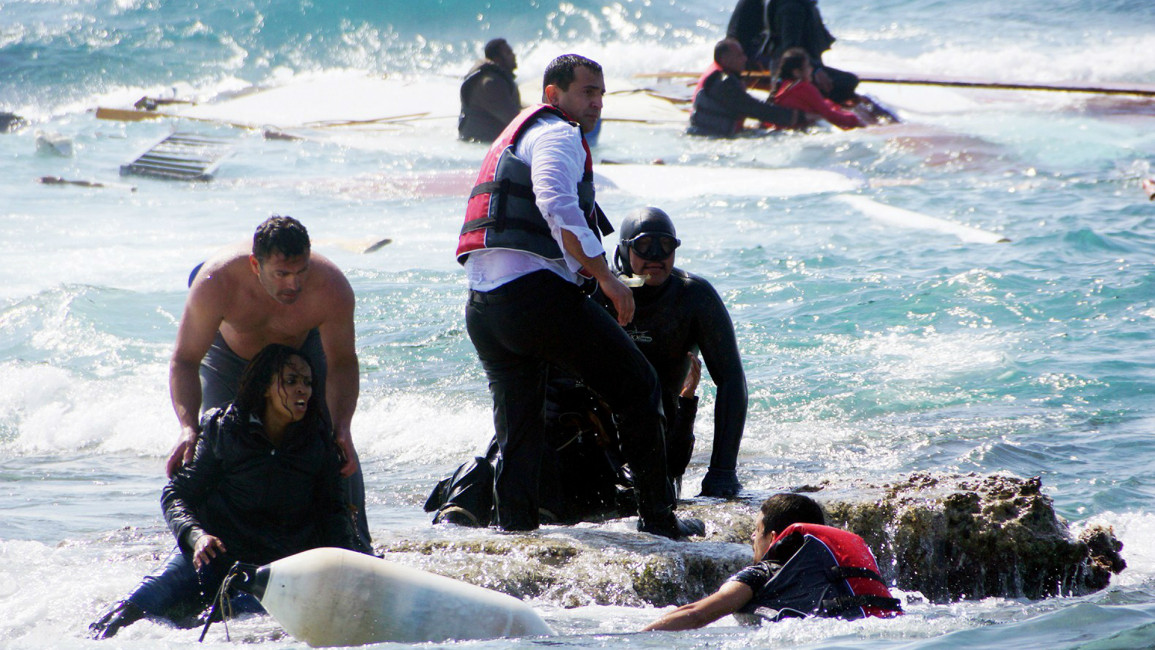Boat captain facing mass murder charge over migrant disaster
Italian police arrested two suspected people traffickers Tuesday on suspicion of causing the deaths of an estimated 800 people when a migrant boat capsized off Libya on Sunday.
Prosecutors in the Sicilian city of Catania said they believed Tunisian national Mohammed Ali Malek, 27, was responsible for steering mistakes and the reckless overcrowding which led to the horrifying shipwreck.
Crew member and Syrian national Mahmud Bikhit, 25, was also arrested in a probe into a catastrophe that has evoked chilling comparisons with the slave trade and allegations of callous disregard on the part of European governments.
The captain was held on suspicion of multiple murder, causing a shipwreck and aiding illegal immigration. Bikhit faces potential charges on the latter count.
| There were a little over 800 people on board, including children aged between 10 and 12 |
Hundreds of the victims, including an unknown number of children, died in hellish circumstances having been locked in the hold or the middle deck of the 20-metre boat which keeled over in pitch darkness after colliding with a Portuguese container ship answering its distress call.
Those who escaped with their lives described to officials the moment the 20-metre trawler carrying them capsized after a Portuguese merchant ship approached the vessel, causing a stampede.
"There were a little over 800 people on board, including children aged between 10 and 12. There were Syrians, about 150 Eritreans, Somalians. They had left Tripoli at about 8 am on Saturday," Sami said.
The survivors hailed from Mali, Gambia, Senegal, Somalia, Eritrea and Bangladesh, she added, and all had been taken to nearby holding centres.
The International Organisation for Migration (IOM) stated that more than 1,750 migrants have perished in the Mediterranean since the start of the year - more than 30 times higher than during the same period of 2014,
"IOM now fears the 2014 total of 3,279 migrant (deaths) on the Mediterranean may be surpassed this year in a matter of weeks, and could well top 30,000 by the end of the year, based on the current death toll," spokesman Joel Millman told reporters in Geneva.
UNHCR spokesman Adrian Edwards meanwhile said Sunday's migrant boat tragedy off Libya in which 800 people died was "the deadliest incident in the Mediterranean we have ever recorded."
Edwards said there had been 1,300 deaths in April alone, making it the deadliest month on record.
Facing pressure
The UN human rights chief Zeid Ra'ad Al Hussein said the horror at sea had been produced by a "monumental failure of compassion" on the part of European governments who are now under intense pressure to address the humanitarian crisis on their southern shores.
French President Francois Hollande on Tuesday called for Europe "to go much further" in tackling the migrant crisis.
"The European summit on Thursday cannot be an ordinary summit where we take ordinary decisions," Hollande said ahead of the urgent meeting.
"We must go much further and I call on all Europeans and beyond to tackle these questions which have become intolerable on a humanitarian level and intolerable on a political level," he said.
Hollande repeated calls for more maritime and aerial surveillance over the Mediterranean.
"But that won't be enough," he said, saying the roots of the problem causing thousands of migrants to flock to Europe must also be dealt with.
He joined other European and African leaders in highlighting the chaos in Libya as a key problem, providing fertile ground for people smugglers to ship migrants from all over the continent to Europe.
"There are also countries which have been abandoned. I think of Eritrea, with more and more refugees. I also think of what is happening in the Sahel" where the French army is fighting jihadists spread across the vast belt separating northern and sub-Saharan Africa.
"By fighting these traffickers, we fight terrorism and by fighting terrorism we will fight these traffickers. Because they are making money off the back of misery, from distress, from death," Hollande said.
EU foreign affairs chief Federica Mogherini unveiled plans earlier Monday to tackle the growing migrant crisis after telling member states they had "no more excuses" not to act.
First on the list, ministers agreed the current EU border surveillance mission Triton should be increased to extend its range and capabilities on the bloc's southern flank.
Triton replaced Italy's own Mare Nostrum mission, which Rome scrapped late last year in protest that its EU partners would not share the burden.
The EU will also try to capture or destroy people-smuggling boats and increase cooperation across the board, the European Commission said.
The bloc will also offer a "voluntary pilot project on resettlement, providing a number of places to persons in need of protection", a key but small step forward in spreading the problem.
Up to now, countries relatively untouched by the problem had objected to this form of burden sharing, however small.
Diplomats said there could be 5,000 places available but the commission gave no figure.



